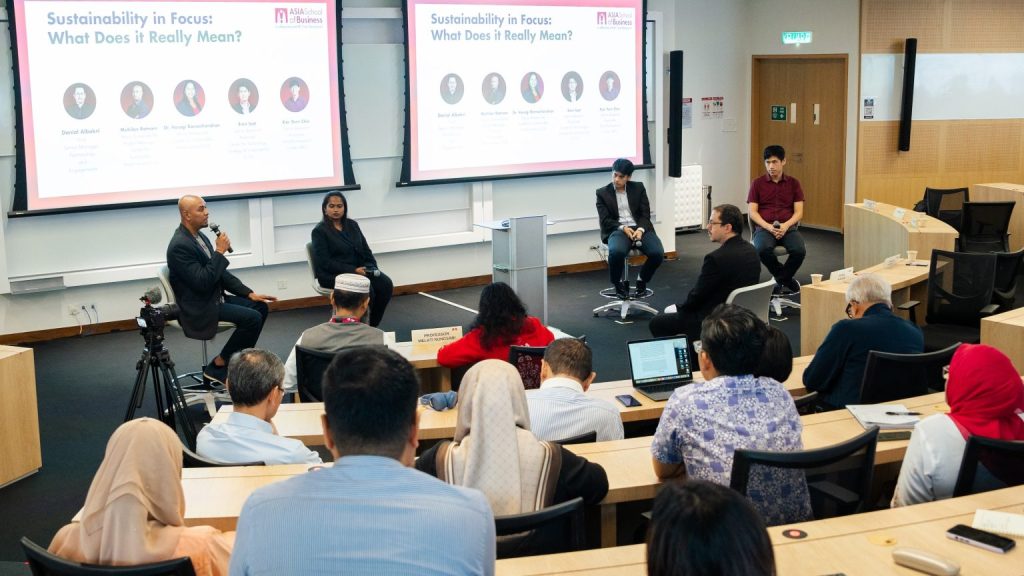KUALA LUMPUR: The Asia School of Business (ASB) had its first annual ASB Research Day 2024 on its cutting-edge research on sustainability across key sectors, including business, energy, and social impact in Malaysia and ASEAN.
This marquee event showcased ASB’s three research centers: The Center for Sustainable Small-owners (CSS), the Center for Technology, Strategy & Sustainability (CTSS), and the ASEAN Research Centre (ARC). It brought together key figures from leading corporations, financial institutions, and human resources professionals, fostering collaboration and dialogue on sustainable practices and innovations shaping the future of ASEAN’s economy.
ASB also shared its research magazine on its sustainability work in business, energy sustainability, and social sustainability, offering a valuable resource for policymakers, corporate leaders, and researchers alike.
In his opening address, Sanjay Sarma, Chief Executive Officer, President, and Dean of Asia School of Business, stated, “The 2023/2024 edition of sustainability research from ASB offers essential insights for regulators, academics, corporate leaders, and policymakers. This year’s emphasis on sustainability confronts critical global issues like climate change and resource depletion, both key to securing long-term economic and societal stability. Backed by our strategic partnerships and the dedication of our team, this research aims to inform ethical, data-driven decisions for a sustainable future. With the region’s sustainability investment projected to reach $150 billion by 2030, our efforts are more crucial than ever.”
In her keynote address, Dr Melati Nungsari, Deputy Dean of Research at ASB, spoke of the critical role businesses play in advancing sustainability. “From our research on sustainability in business, we’ve learned that any serious effort requires the transformation of all stakeholders”. She underscored the region’s role where “ESG adoption across Southeast Asia has risen significantly, with 78% of companies now integrating some form of ESG criteria into their operations. Employees must be equipped with the right knowledge, skills, and technology to incorporate sustainability into their daily work and embrace the changes necessary for long-term success. Clear leadership, regular updates, and rewarding exemplary behaviors are all crucial steps to this transformation.”
The event delved deeper into “Sustainability in Focus: What Does It Really Mean?” with panelists including Dr Vasagi Ramachandran, Kar Yern Chin, Emir Izat, and Muhilan Ratnam where they explored the different sectors of sustainability, a growing research area at ASB. As sustainability becomes a more pressing global challenge, the panel emphasized the importance of raising awareness and educating the public.
ASB’s newly released research magazine, available for pickup and download at https://ebrochure.asb.edu.my/view/16519775/ featured ASB’s work in the following key sections:
Part 1: Sustainability in Business
ASB’s research focuses on partnering with various institutions and industries in the realm of business sustainability. ASB has collaborated with the ASEAN-Korea Centre, palm oil smallholder farmers in Johor under the P&G Smallholder Program, and corporate organizations such as PwC Malaysia. ASB’s work focuses on the “social” aspect of ESG, a key area of concern for firms and businesses. While environmental sustainability often receives significant attention from companies, the complexities of the social aspect and employees are frequently overlooked despite their crucial role in achieving overall sustainability.
Part 2: Energy Sustainability
Energy sustainability addresses the critical challenges of energy security, environmental protection, and social equity. By focusing on sustainable energy practices, The Center for Technology, Strategy & Sustainability (CTSS) at ASB delves into how greenhouse gas emissions can be reduced, mitigation policies for climate change, and the preservation of natural resources. Sustainable energy solutions can promote economic development and social well-being by providing access to clean and affordable energy for all, especially in underserved communities. The transition to sustainable energy systems also drives innovation and job creation in new industries, fostering economic resilience and growth. In essence, energy sustainability is crucial for building a more stable, equitable, and healthy future for our planet and its inhabitants.
Part 3: Social Sustainability
At ASB, social sustainability is closely tied to the ASEAN Research Center (ARC), which conducts research on underprivileged communities to advocate for impactful policies. ARC’s work looked into the hawker community in Malaysia, and palm oil fields to investigate conditions and human rights of the workers. One project under ARC, the Rapid Youth Success Entrepreneurship/Employability (RYSE), conducts both programs and research within Malaysia to empower Malaysian youth with entrepreneurship and employability opportunities.
Originally published by The Exchange Asia.





